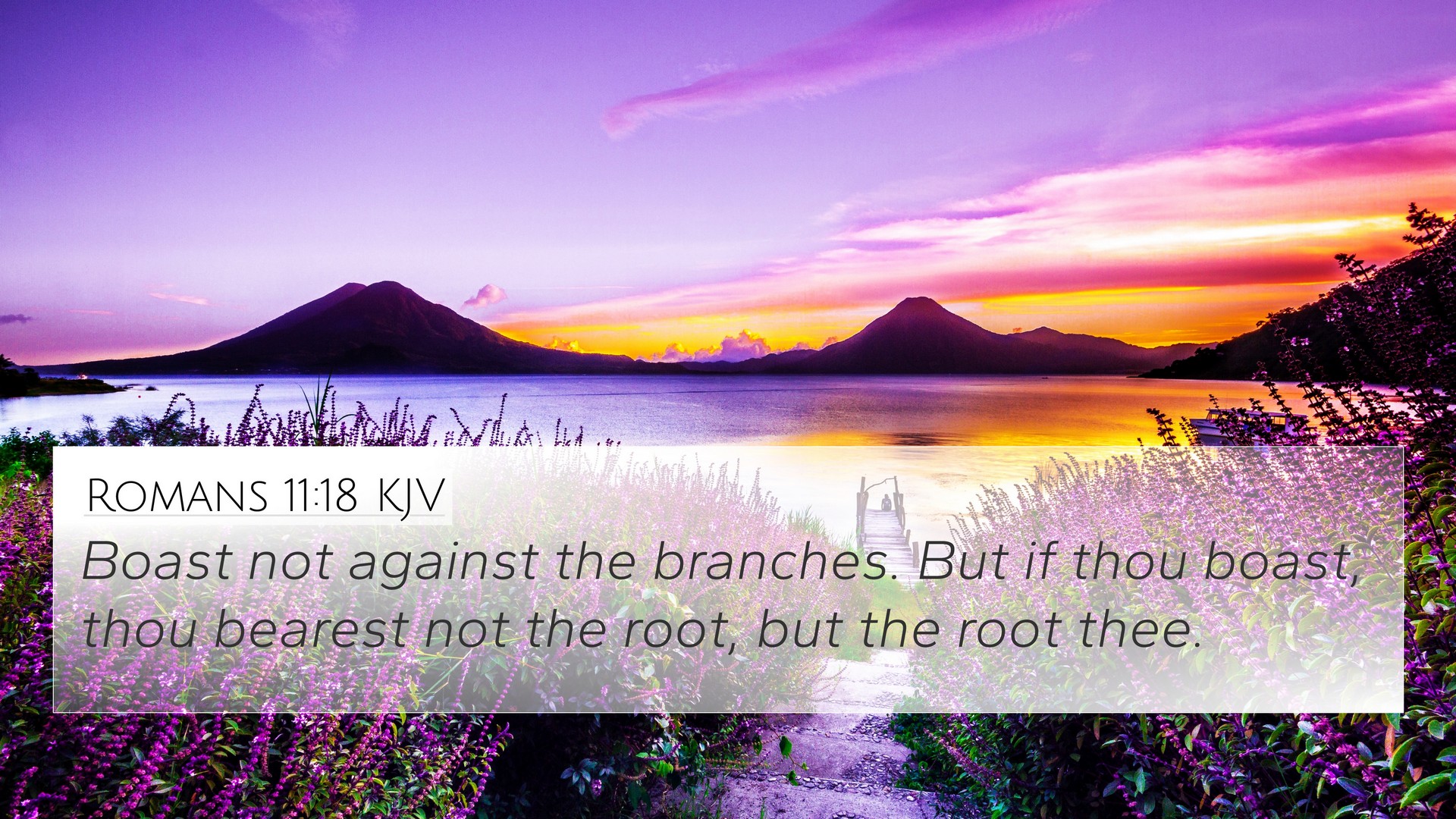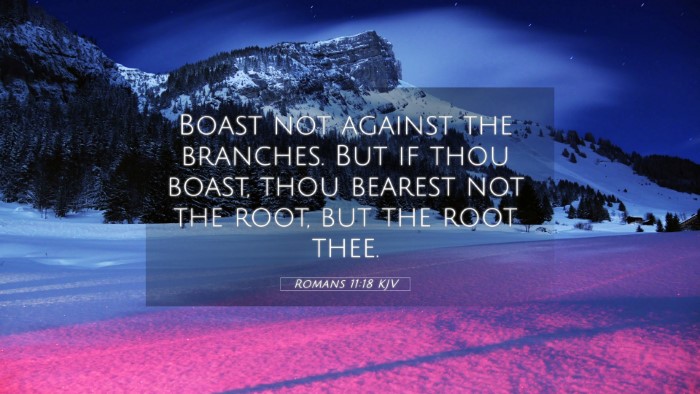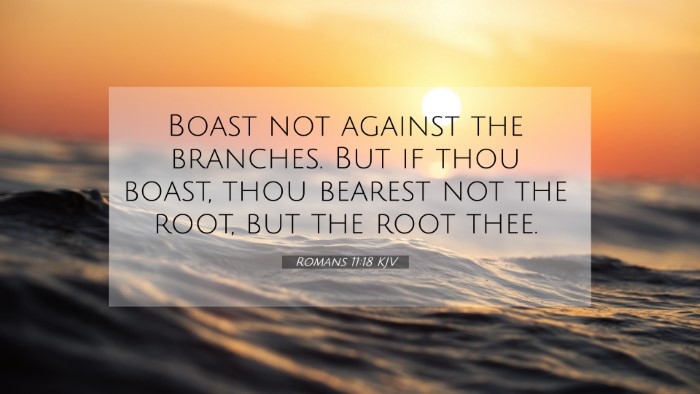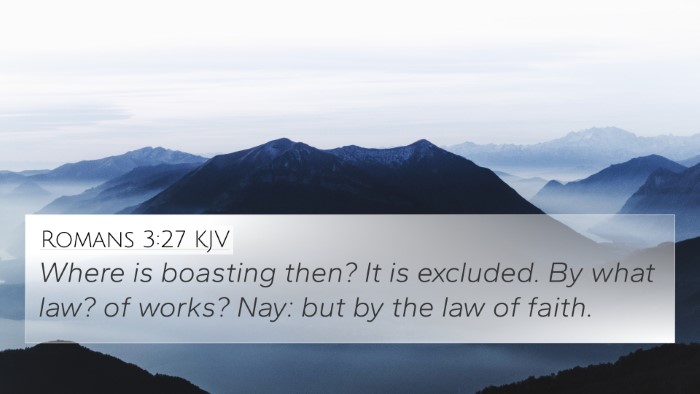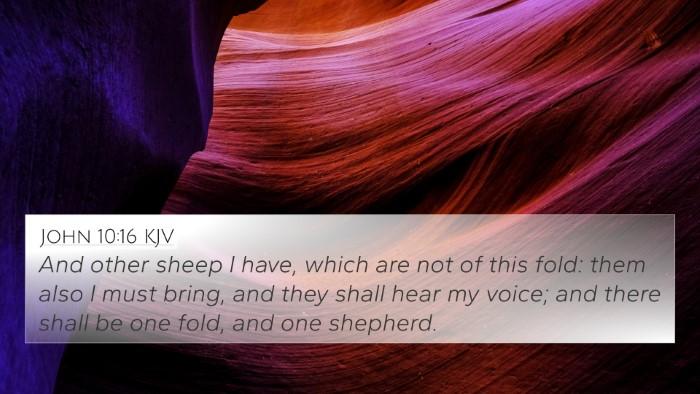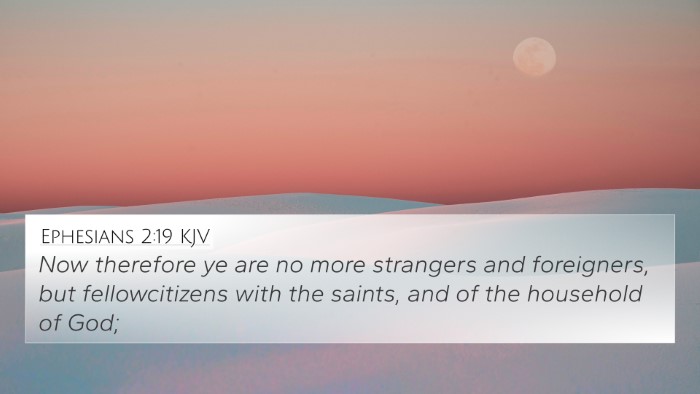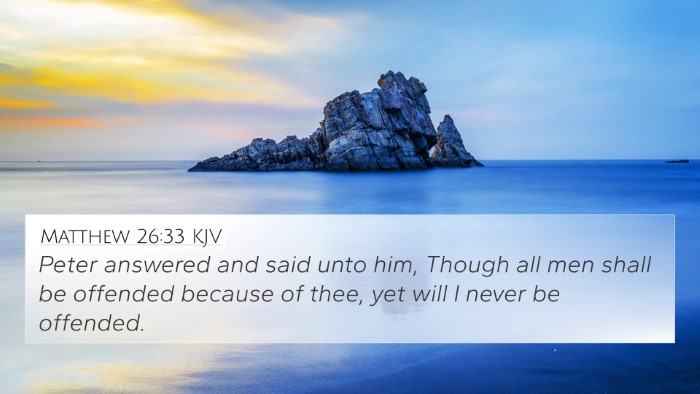Understanding Romans 11:18
Romans 11:18 states:
"Boast not against the branches. But if thou boast, thou bearest not the root, but the root thee."
This verse is a part of the Apostle Paul's discourse on the relationship between Israel and the Gentiles in the context of salvation and divine election. The imagery of the root and branches is significant in understanding the theological implications of this passage.
Summary of Insights from Public Domain Commentaries
Drawing from respected commentaries such as those by Matthew Henry, Albert Barnes, and Adam Clarke, we can glean the following insights:
-
Contextual Understanding:
Paul uses the metaphor of an olive tree to represent God's covenant people. The branches symbolize the Jews, while the Gentiles represent the wild olive branches grafted in through faith.
-
Humility in Salvation:
Matthew Henry emphasizes the importance of humility for Gentile believers. The warning against boasting signifies that they owe their spiritual inheritance to the root, symbolizing Jesus Christ and His promises.
-
Dependence on the Root:
Albert Barnes comments that the Gentiles should recognize that their spiritual sustenance comes from the Jewish roots of their faith. This indicates a need for appreciation rather than arrogance.
-
Theological Significance:
Adam Clarke explores the notion that boasting is contrary to the spirit of the Gospel. This verse highlights the interconnectedness of Israel and the Church, presenting a unified body of believers.
-
Warning Against Pride:
The verse serves as a cautionary note against any sense of superiority the Gentile Christians might feel. They are merely partakers of the promises originally given to Israel.
-
Roots of Faith:
This verse points to the foundational role of Jewish heritage in Christianity, reminding believers that the Gospel is rooted in God's eternal plan established with the Jewish people.
-
Interconnectedness of the Covenant:
Henry further elaborates that the covenant of grace encompasses both Jews and Gentiles, urging unity and respect among believers from different backgrounds.
-
Hope for the Future:
Barnes notes that there remains hope for the natural branches, suggesting that the salvation offered through Christ is open to all, including the Jewish people, and calls for an attitude of expectancy.
Cross References Related to Romans 11:18
In understanding Romans 11:18, several other scriptures can be referenced to deepen our comprehension and draw connections:
- Jeremiah 11:16: Here, God describes Israel as a green olive tree, reinforcing the allegory of the olive tree used in Romans.
- John 15:1-5: Jesus declares Himself as the true vine, illustrating the significance of remaining connected to Him as the source of life.
- Ephesians 2:11-12: Paul speaks of Gentiles being once separated from Christ but now brought near through His blood, paralleling the themes of inclusion in Romans 11.
- Galatians 3:28: This verse highlights the equality of all believers before God, echoing the idea of unity without boasting.
- Matthew 15:24: Jesus refers to His mission to the lost sheep of the House of Israel, which adds layers to the understanding of the roots Paul mentions in Romans.
- Romans 11:11: This prior verse discusses how salvation came to the Gentiles to provoke Israel to jealousy, connecting back to the theme of boastfulness.
- Revelation 7:9: The vision of a multitude from every nation worshiping God underscores the unifying aspect of salvation for all.
- 1 Corinthians 1:31: Paul underscores that he who boasts should boast in the Lord, resonating with the message of humility presented in Romans 11:18.
Bible Verse Cross-References
Understanding the connections between Bible verses is essential for deepening one's grasp of Scripture. The following tools are helpful for cross-referencing biblical texts:
- Bible Concordance: A comprehensive index of biblical terms and their occurrences.
- Bible Cross-Reference Guide: Resources that help identify links and parallels between scriptures.
- Cross-Reference Bible Study: Methods to delve into verses that illuminate similar themes or teachings.
- Bible Reference Resources: Tools designed to aid in the efficient identification of scriptural connections.
- Bible Chain References: This method correlates verses thematically, helping in the exploration of specific doctrines.
Final Insights
In summary, Romans 11:18 serves not only as a warning against spiritual pride but also emphasizes the importance of recognizing the root from which one's faith draws its sustenance. The interconnectedness of both the Jewish and Gentile believers in the covenant of grace offers a profound lesson on unity and humility within the body of Christ.
